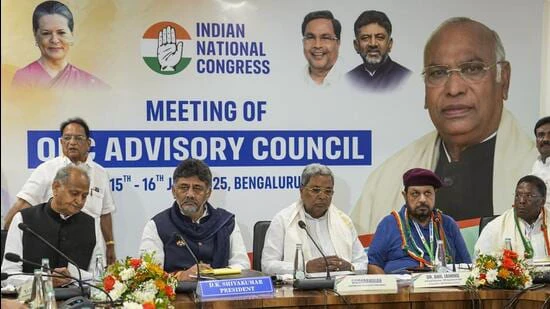Chief minister Siddaramaiah on Tuesday pushed for adopting the state’s backward class empowerment model at the national level, while accusing the Bharatiya Janata Party of systematically blocking OBC welfare measures and weakening the framework of social justice in the country.
Speaking at the first All India Congress Committee (AICC) OBC Advisory Council meeting hosted in Bengaluru, Siddaramaiah said India’s democracy would remain incomplete unless backward communities were fairly represented in politics, education, and the economy. “India can never be a true democracy unless the majority who come from OBC, SC, ST and minority communities, that is the AHINDA communities, are not only counted, but also heard,” he said.
The session began on Tuesday at the KPCC headquarters and will continue at a private hotel on the second day. It will address the caste census against the backdrop of the Centre’s announcement that the national census will include caste data. The discussion gains significance as Leader of Opposition in the Lok Sabha, Rahul Gandhi, has been vocal about the need for a caste census. The agenda also includes a discussion on Article 164(1) of the Constitution, with reference to developments in Jharkhand, Odisha, Madhya Pradesh, and Chhattisgarh.
During his address, Siddaramaiah accused the BJP and its ideological parent, the RSS, of opposing social justice “not just politically, but ideologically,” and said their discomfort with caste-based data and representation had denied rightful opportunities to marginalised groups. “The BJP stalled the caste census, weakened the National Commission for Backward Classes, and bypassed reservations through privatisation and lateral entry,” Siddaramaiah said.
The chief minister said the Congress must now lead a nationwide campaign to implement a fresh socio-economic and caste-based census and ensure proportional political and economic representation based on its findings. “This is not a fight for reservation to Backward Classes alone. This is a fight for recognition, dignity, and power of these classes,” he said, warning that the time had come to move from symbolism to structural transformation.
Taking aim at the Centre’s Agnipath scheme, Siddaramaiah said it denied long-term employment to OBC youth and reduced their future to “just four years of service.” He also criticised the Union government for failing to act on the findings of the 2011 Socio-Economic and Caste Census and accused it of treating OBCs as “mere symbols” rather than equals.
Siddaramaiah also said that Karnataka had consistently led India’s social justice efforts – from Mysore’s 1921 reservation policy to the state’s Havanur and Kantharaj Commissions. He said the Congress government had restarted the process of conducting a second comprehensive socio-economic survey in the state, after the then-state BJP government “withheld” the previous report from 2019 to 2023.
“Karnataka was not just a beneficiary of progressive ideas, we were pioneers,” he said. “The Karnataka model is principled in its commitment to social justice and equity. It is rooted in fraternity. It is based on data and scientific surveys. And it is now ready for a national-level adoption.”
Siddaramaiah also pointed to the underrepresentation of OBCs in central services – where their share remains around 22%, despite the legal provision for 27% reservation – and high dropout rates in premier educational institutions, which he attributed to lack of institutional support and systemic bias.
“What chance does the son of a weaver or a toddy-tapper or a shepherd have against the son of an upper-caste landlord?” he asked.
Citing landmark constitutional provisions and past Congress-led initiatives – from Mandal Commission implementation to the 93rd Constitutional Amendment on reservations in higher education – Siddaramaiah said the party had a historic responsibility to revive the agenda of social equity. “We commit to a nationwide socio-economic and educational caste census, proportional political representation, expanded reservations in private sector jobs, and a new ecosystem of hostels, scholarships, and skill development schemes,” he said.
He also urged the OBC Advisory Council to transform itself into a permanent policy-shaping body that will drive backward class representation, saying it should no longer be viewed as a token forum.
“This council is not a formality, it is the soul of India’s social justice movement,” he said.
Reiterating Congress leader Rahul Gandhi’s demand for caste-based representation, Siddaramaiah said, “Jitni aabadi, utna haq – as much population, that much right. That is the heart of democracy and that is what we fight for.”
The meeting was attended by several senior Congress leaders, including deputy chief minister DK Shivakumar, former chief ministers Ashok Gehlot, Bhupesh Baghel, V Narayanasamy, Veerappa Moily, and AICC OBC department chairperson Anil Jaihind.
Siddaramaiah concluded by calling the AHINDA alliance – comprising minorities, backward classes, and Dalits – a “voice of India’s conscience,” not a vote bank, and said that the future of the country must be built on inclusion and equality.
HT reached out to the BJP for a comment on the meeting but did not receive any response.
